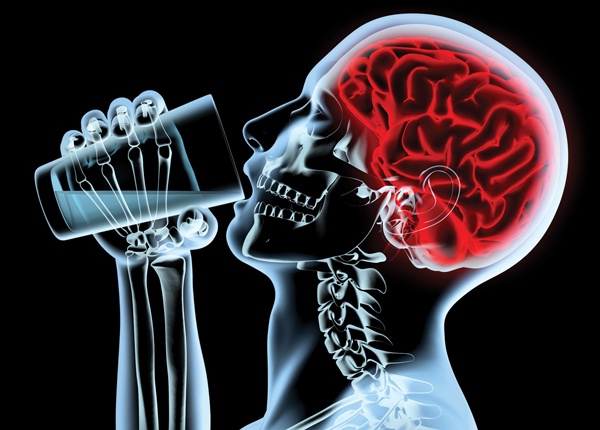
Alcohol Consumption and Sensory Impairment - A Recipe for Driver Error
Updated Nov. 21, 2020Alcohol’s effects on your brain begin just minutes after you take the first sip of your beverage. The human brain is such a powerful processing tool that it requires a significant amount of blood to function effectively. Each minute, around 750 milliliters of blood passes through your brain. If your BAC is high, impairment of your neurological processes will be rapid and significant.
The brain is the crowning jewel of the central nervous system, which sends and receives messages throughout the body to manage bodily processes, collect information and control your movements. These messages are transmitted via neurons, which are disrupted by alcohol. As the brain has an extremely high concentration of neurons, it is particularly vulnerable to the effects of alcohol intoxication.
When neurons are unable to send signals effectively, every process in your body is hindered. Your mental ability will be adversely affected, and your muscles will not respond to instructions as efficiently as usual. The negative impact of alcohol will become more severe as you become more intoxicated.
- 1

Light intoxication.
You will experience trouble focusing, inability to reason, poor judgment abilities and memory loss. - 2

Moderate intoxication.
Your reflexes and coordination will be disrupted as your muscle control becomes poorer. - 3

Heavy intoxication.
Eventually, “automatic” bodily functions such as breathing and vital organ control will be affected. This is severe alcohol poisoning, which often results in death.
Alcohol and the nervous system
The nervous system is the network of nerves connecting every tissue in your body, through which messages are sent via the spinal cord and brain (which comprise the central nervous system). The central nervous system organizes and coordinates two types of “action” within the body:
- Vital actions that do not require thought input. Such as your heartbeat, breathing, hormone release, digestion etc.
- Deliberate actions that do require thought input. For instance, reaching across a table to pick up your coffee cup, or pressing your foot down on the accelerator.
Drugs and alcohol work by disrupting the nervous system’s processes. These substances can be extremely dangerous if used unwisely, as they interfere with the nervous system’s ability to carry out both deliberate AND unconscious tasks. Consuming even a small amount of alcohol will affect the workings of your entire body. Serious alcohol intoxication can affect vital body functions, resulting in organ failure, brain damage and death.
Alcohol is a depressant, which means it “slows down” the nervous system and makes you feel sleepy – which is extremely dangerous if you’re driving. Moreover, alcohol interferes with the body’s ability to achieve good-quality, restful sleep. Therefore, regular consumption of alcohol can lead to a disturbed sleep pattern which leaves you more susceptible to become fatigued and falling asleep at the wheel, even when you haven’t had a drink.
Effects on motor skills
Your brain controls any and all deliberate movements you make. This may not be something you have previously considered, as most of us do not actively “think” about putting one foot in front of the other when we walk, or “decide” how much pressure to apply to an object we are handling. We do not notice our brains making these careful calculations or sending precise instructions to our muscles. However, we quickly notice when these processes are disrupted by alcohol intoxication. It may be funny when alcohol causes you to drop a drink, bump into a table or trip over your own feet, but where driving is concerned, loss of motor skills is no joke.
The motor skills we take for granted are essential to safe driving. We need to be able to execute precise movements quickly and accurately when responding to changes in the roadway environment. If your brain is impaired by alcohol, controlling your car will be more of a challenge and you will be far more susceptible to making fatal mistakes.
Drinking disrupts motor skills in two ways:
- 1

Alcohol renders you less coordinated.
Your muscles will become less responsive to instructions from your brain. While driving, poor coordination could leave you fumbling for in-car controls you can usually reach without looking, or missing the brake pedal altogether when you need to slow down or stop. - 2

Alcohol slows your reactions.
When a brain is affected by alcohol, it takes longer to process information and decide how to act. By the time you come to executing a maneuver while driving, it may be too late to avoid a hazard.
Effects on vision
Alcohol has a multifaceted, detrimental effect on vision. As your nervous system is disrupted:
- Your eyes will not be able to move as quickly or precisely to scan the roadway.
- Your pupils will not be able to expand and contract as normal, leaving you susceptible to being blinded by bright lights or unable to see clearly in the dark.
- It will be harder to focus on specific objects as your corneas and lenses are affected.
The combined effect of these vision impairments will leave you unable to pick out important details and less able to gather information about the entire roadway environment. You will also be more at risk of zoning out or falling asleep at the wheel, as you are visually detached from your surroundings.
Effects on memory and focus
Alcohol also affects your ability to understand and evaluate the information you collect about the driving environment, by disrupting two vital functions:
- Memory. Alcohol leads to memory loss and trouble in organizing ideas. You must be able to access stored memories quickly and effectively, to make sense of what you see on the road.
- Focus. Alcohol makes clarity of thought difficult. While intoxicated, your mind will wander away from present tasks and become preoccupied with unrelated memories or ideas.
Effects on judgment
One of alcohol’s most dangerous effects is that it impairs judgment and reasoning ability. Given the same information, you will not make the same decisions and choices while intoxicated as you would while sober. This often leads to taking unnecessary risks while driving. Alcohol’s effect on judgment is one of the main reasons people drink and drive in the first place. After a few drinks, you may fail to recognize just how intoxicated you are. Or, you may simply decide that driving is a risk worth taking. Thanks to the hundreds of thousands of drunk-driving collisions that occur around the country every year, we know how these stupid judgment calls often pan out.
A recipe for driver-error
The combined cognitive effects of alcohol create the perfect conditions for driver-error to occur. While under the influence of alcohol, you will not be able to comprehensively collect visual information about the roadway environment. Even if your vision was unaffected, you would not be able to draw on your memories and make sense of what you have seen as effectively as you can when sober. If by some miracle you manage to scan and evaluate the roadway environment efficiently, you would still be at a much higher risk of crashing while intoxicated, as alcohol will leave you with poor judgment.
The cognitive and sensory impairments caused by alcohol consumption are dangerous enough all on their own. Sadly, they are not the only handicap you will have to deal with if you choose to drink and drive. Next up, we look at the physical effects of alcohol.




